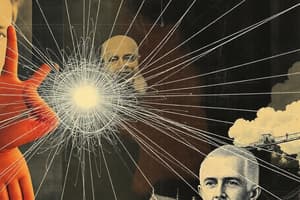Podcast
Questions and Answers
Electric field lines are always straight and parallel to each other.
Electric field lines are always straight and parallel to each other.
False (B)
The electric field intensity is a vector quantity.
The electric field intensity is a vector quantity.
False (B)
Electric field lines point towards positive charges.
Electric field lines point towards positive charges.
False (B)
Electric field due to a point charge is described by Ohm's law.
Electric field due to a point charge is described by Ohm's law.
The density of electric field lines indicates the field strength at different points in space.
The density of electric field lines indicates the field strength at different points in space.
Electric force acting on a unit charge placed in a field is described by the electric field intensity.
Electric force acting on a unit charge placed in a field is described by the electric field intensity.
The electric field intensity increases with increasing distance from the charge.
The electric field intensity increases with increasing distance from the charge.
The electric field due to a point charge is not radially symmetric.
The electric field due to a point charge is not radially symmetric.
Integrating the electric fields of individual charges is necessary when dealing with a small number of charges.
Integrating the electric fields of individual charges is necessary when dealing with a small number of charges.
The electric field due to a continuous charge distribution cannot be calculated using surface charge density for two-dimensional distributions.
The electric field due to a continuous charge distribution cannot be calculated using surface charge density for two-dimensional distributions.
A capacitor stores electrical charge but does not generate an electric field between its plates.
A capacitor stores electrical charge but does not generate an electric field between its plates.
The electric charge stored in a capacitor is inversely proportional to the electric field between the plates.
The electric charge stored in a capacitor is inversely proportional to the electric field between the plates.
Flashcards are hidden until you start studying
Study Notes
Electric Field
An electric field is the theoretical space between electrically charged particles. It is the mechanism for explaining the interactions between electric charges and mediates the electric force between them. The electric field is a vector field, meaning it has both magnitude and direction, and by definition, it points away from positive charges and toward negative charges.
Electric Field Lines
Electric field lines are smooth, usually curved lines that indicate the direction of the electric field. These lines often resemble the contour lines of topographic maps, with lines of equal potential being perpendicular to the direction of the electric field. The density of the electric field lines, which is the number of lines per square meter, indicates the field strength at different points in space.
Electric Field Intensity
The electric field intensity, denoted as (E), is the magnitude of the electric field vector. It is a scalar quantity and is measured in units of volts per meter (V/m). The electric field intensity describes the electric force acting on a unit charge placed in the field.
Electric Field Due to Point Charges
The electric field due to a point charge is described by Coulomb's law, which states that the force between two charges is directly proportional to the product of their charges and inversely proportional to the square of the distance between them. This law also applies to the electric field, meaning that the electric field intensity decreases with increasing distance from the charge. The electric field due to a point charge is radially symmetric and points away from the positive charge and toward the negative charge.
Electric Field Due to Continuous Charge Distribution
For a continuous charge distribution, the electric field can be calculated by integrating the electric fields of individual charges. This is necessary when dealing with a large number of charges, which cannot be treated as discrete entities. Common cases of continuous charge distributions include one-dimensional (such as a wire), two-dimensional (like a metal plate), and three-dimensional (such as a metal sphere). The electric field due to a continuous charge distribution can be calculated using the surface charge density for two-dimensional distributions and the linear charge density for one-dimensional distributions.
Electric Field in Capacitors
An electric field is also present in capacitors, which are devices that store electrical charge. In a capacitor, two conductive plates are separated by a non-conductive material called a dielectric. When a voltage is applied to the capacitor, electric charges are stored on the conductive plates, creating an electric field between them. The electric field in a capacitor is proportional to the voltage applied to it, and the electric charge stored in the capacitor is directly proportional to the electric field between the plates.
Studying That Suits You
Use AI to generate personalized quizzes and flashcards to suit your learning preferences.




